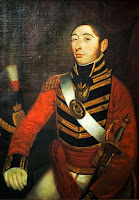HANOVERIAN COLONEL
Christian Friedrich
Wilhelm Von Ompteda
Born: 26 November
1765 – Ahlden an der Aller, Hanover
Died: 18 June 1815
– La Haye Sainte, Belgium
Rank: Colonel
In 1771 at the age of six, Ompteda was sent to his uncle Dietrich Heinrich Ludwig Von Ompteda to be educated and when he was 12 years old in 1777 he joined the Royal Corps of Pages at Hanover. In 1781 he became a lieutenant in the foot guards. In 1793 Ompteda rose to command a grenadier company in the French Revolutionary Wars and was badly wounded at Mont Cassel, and then in 1794 he sailed to England with Field Marshall Wilhelm Von Freytag.
By 1803 he was a
major in a regiment of the Hanoverian guards, and when the Convention of
Artlenburg dissolved the Hanoverian army on 5 July 1803, he was one of the
first to join what was to become the King’s German Legion. In 1805 he led an
unsuccessful expedition to northern Germany during the War of the Third
Coalition. A year later he and his battalion was moved to Gilbraltar.
In 1807 his
battalion was moved again and shipped out to Zeeland, where they fought against
Denmark in the Gunboat War, known as the English Wars. On his return journey
his ship sank off the coast of the Netherlands and he was taken prisoner in
Borkum until being freed in a prisoner exchange in 1808.
In 1812 Ompteda was
made lieutenant Colonel and in 1813 he was put in command of the Legion’s 1st
Light Battalion KGL. By 1815 he was a Colonel and a brigade commander in General
Charles Alten’s division within Wellington’s army.
Ompteda was killed
at Waterloo after being ordered by the Prince of Orange into a counter-attack
in column with the 5th Line Battalion to retake La Haye Sainte.
As the 5th Line
Battalion under colonel Ompteda was on its way to reinforce the defenders of La Haye Sainte, the French cavalry attached to Jean-Baptiste Drouet, d'Erlon's
Corp I rode them down; only a few of the intended relievers survived. Ompteda
was shot at point blank range. He was 49 years of age.
After a six-hour
defence, without ammunition, or reinforcements, the KGL were forced to abandon
the farm, leaving the buildings in shambles and their dead behind. A total of
over 4,000 cavalrymen and soldiers were said to have been buried in the
communal grave opposite the farm after the battle.
There is a plaque to Baring ,
Von Ompteda and the KGL on the outer wall of La Haye Sainte.
Allessandro Barbero
describes Ompteda's final moments as follows in his excellent re-narration of
the battle of Waterloo:
"Suddenly, the
order came to deploy in line and advance at a walk; when his men were some
sixty yards away from the enemy, Ompteda had the bugler sound the charge and
urged his horse into the midst of the thick line of French skirmishers. The
tirailleurs scattered. Colonel von Ompteda was encircled by enemy infantry, and
the French officers, amazed by his courage, shouted to their men to take him
alive; but Ompteda, who was by then beside himself, started aiming
sabre-strokes at the heads of the men surrounding him, and someone lost
patience. When lieutenant Weatherly regained consciousness, the colonel lay
dead two steps away from him, with his mouth open and a hole in his
throat."
 |
| The Plaque at La Haye Sainte |











